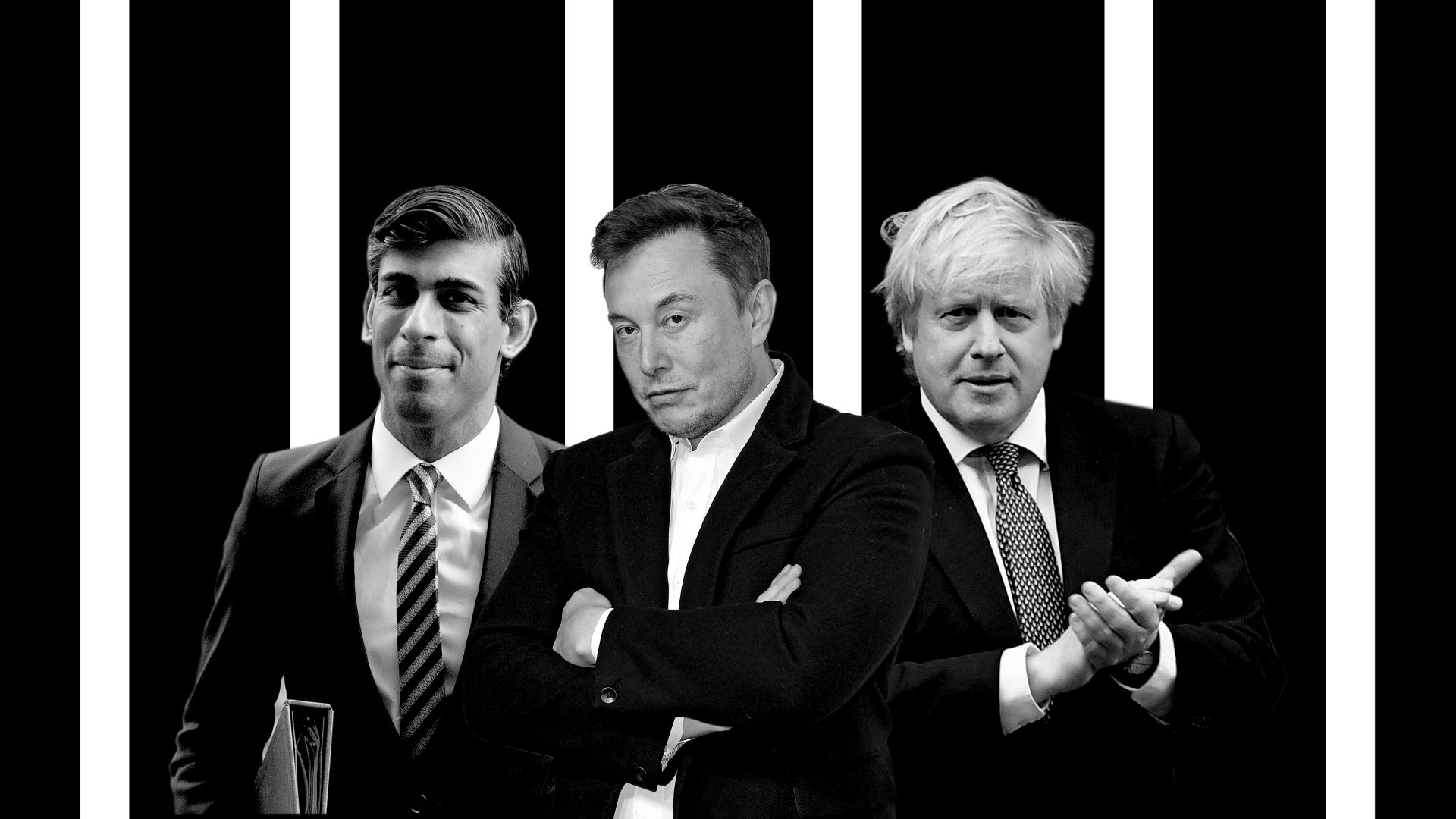It is not all that hard to imagine that the world’s political elite and the world’s billionaires spent the Easter weekend together somewhere, both drinking and laughing at our expense.
It’s particularly easy to imagine in the case of the current UK government, given Boris Johnson’s known proclivities for skipping his security detail to party with oligarch pals, or Rishi Sunak’s own status as a multimillionaire – and with the atomthin skin of the ultra-rich to match, too, when anyone dare question his family’s personal financial decisions.
Some secret socialisation might at least explain one thing – why the men at the top of the government of the UK appear to be running by the playbook of the world’s richest man, Elon Musk.
Given he’s got a net worth of around $250bn (£192bn) – more than a decade of the UK’s aid spending, just for reference – Musk cuts an oddly tragic figure, relentlessly acting like the ultimate online edgelord, promising the world and then under-delivering.
Musk has variously promised to deliver ultrafast “hyperloop” trains (expensive, inefficient, not really operational, and none have been built), underground tunnel networks for Miami (famously a city on a swamp, at sea level), a manned mission to Mars (nope), to take Tesla private with money from Saudi Arabia (also nope), and numerous other false promises.
His latest hype cycle is a supposed offer to buy Twitter, after gaining a 9.2% stake in the company and accepting – and then rejecting – a place on the company’s board. Musk publicly tweeted a series of questions about the company’s strategy, the failings of its executives, and offered no explanation of where the funding for his bid would come from.
The substance of his bid looks set to be a lot of column inches, an inflamed culture war on online free speech, and a couple of juvenile “420” jokes. For Musk this was better than his tweeted out “bid” to take electric carmaker Tesla private – which featured the same juvenile jokes, but also landed Musk with a multimillion-dollar fine, a requirement to have lawyers vet his tweets, and required him to stand down as chairman of Tesla.
This sanction would end the career of most executives – it’s how markets are supposed to work to protect investors from “pump and dump” tricks to manipulate stock prices, and to require information to be shared with markets in a structured and trustworthy way.
But Musk was just too damn rich and too damn indifferent to challenge with mere rules: yes, he supposedly paid the price for his actions, but he didn’t change his attitude or his behaviour. He had discovered a magical loophole in the rules: if you’re rich enough and powerful enough, and care little enough, you can make everyone else indifferent to the rules, too.
Does that sound familiar? As it certainly seems to represent the attitude of the current residents of Downing Street, the arch-gaslighters of the electric era. When the Partygate series of scandals first emerged, Boris Johnson – whose health secretary and Covid statistical adviser had both resigned over Covid rules breaches – said he was outraged at the very idea of Downing Street parties.
Later, he said he hadn’t attended any, and was confident no rules had been broken – but would take serious action if it was found anyone had broken the guidance. Later still, he admitted attending some parties, but said they followed the rules.
Now, we know he attended the parties, he broke the rules at least once, was found by the police to have broken the rules – potentially even in his own flat – and plans to do absolutely nothing about it.
Politicians who just weeks before had said it would, of course, be inconceivable for a prime minister who broke the law – let alone a law he himself passed in office – to remain in office went out and parroted Johnson’s ridiculous line, prostrating themselves in public to their boss over their electorate.
Johnson had, after all, shown them the new truth of power in Britain – if the person at the top doesn’t care about the rules, no one else has to, either.
If God himself descended from the skies and called on Boris Johnson to resign, Jacob Rees-Mogg would lead Conservative MPs on a broadcast round explaining how inappropriate it was of the “woke” Almighty to intrude on politics – as evidenced by spluttering Tory indignation when Church of England archbishops (who sit in the Lords) dared to use their Easter Sunday sermons to lecture on morality and on helping those in need, rather than turning them away.
So much for Johnson. With Rishi Sunak, it is all but impossible to tell whether his course of action was shaped by his spectacular arrogance or by his political ineptitude – with the inevitable answer it must surely be both.
Sunak’s arrogance ended his chances of political elevation in just a few short weeks – his belief that his wife could claim non-dom status, and he himself could hold a US green card for more than 18 months as chancellor, without political consequence, comes only from an utter lack of regard for the public and the press, even leaving aside unanswered questions that remain on some family trusts.
His political ineptitude fed into this; he did not get ahead of the issue and left himself wide open to attacks as a multimillionaire unwilling to do more than the bare minimum in a generational cost-of-living crisis – while also telling the public he was saving up enough money for a tax cut in a few years’ time, when it might suit him more.
Had Sunak seen clearly his own political prospects were about as good as those of Mr Blobby, and had he the killer instinct to save his reputation, he could have used his own Covid fine as a chance for a barbed resignation – saying it was clear that no one could hold public office having been found to break the law in the heart of government, felling Johnson below the waterline and giving himself a dignified exit.
Instead, he briefed yet again that he had agonised over resigning before deciding – yet again – that the world needed him too much, and he must stay in office, as if the tearful public had been laying flowers at the door of No 11, playing Stay Another Day on a loudspeaker.
By all accounts, Sunak and Johnson loathe one another, despite seeming to share so much in their sensibilities – their high regard for their own abilities, their inability to care about the consequences of their actions, and their total inability to do anything much that is all that meaningful.
This they share with Elon Musk. To see men such as these running the world is dispiriting to the point of despair – but there is, at least, one glimpse of light, one sliver of joy among it all.
These are all men who should be on top of the world, and yet each of them seems as if it is falling apart all around them. All of that, and they can’t even enjoy it.




